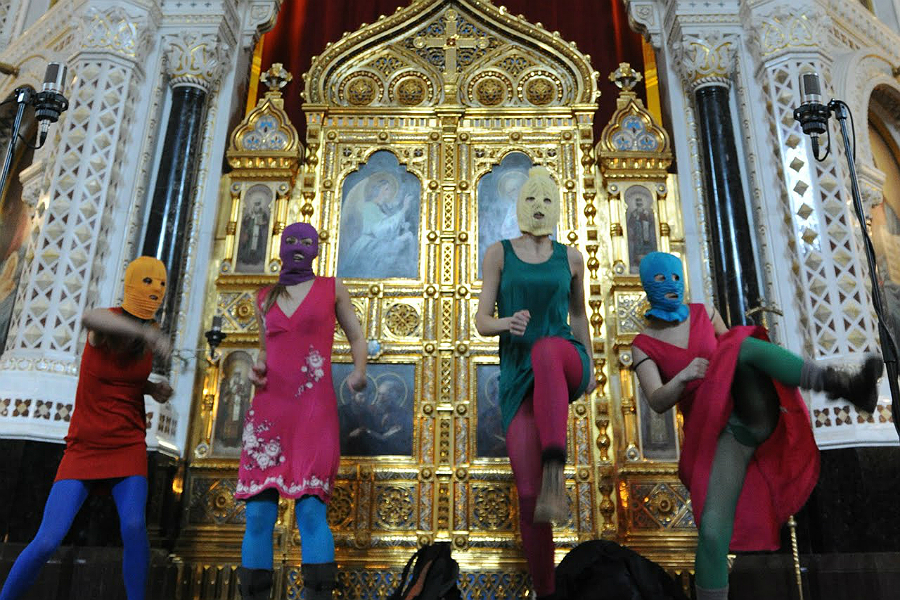Pussy Riot: A Punk Prayer – Reviewed

Documentary Pussy Riot: A Punk Prayer highlights what can happen to the victims of a state out of time…
On February 21st of last year, members of the feminist art collective Pussy Riot walked into Moscow’s Christ the Saviour cathedral and performed a satirical punk anthem against what they saw as the unity of their country’s church and state and, in particular, the tsar-like status of figurehead Vladimir Putin.
The performance lasted less than a minute before their arrest on breach of the peace charges, which later becomes muddied with accusations of sacrilege. Pussy Riot: A Punk Prayer, directed and produced by Mike Lerner (Afghan Star, Hell and Back Again) and Maxim Pozdorovkin (Capital), charts the aftermath; the fallout on either side of the argument and the ensuing court case.
While never delving too deeply beneath the surface – at one point I lost concentration and was put in mind of movie The Baader Meinhoff Complex – this documentary certainly has its moments. The almost comedic (if this weren’t real life), certainly Kafkaesque, machinations of Russian justice are shown up time and time again; as one of the defence lawyers declares: “There is no law against blasphemy.”
Much time is given over (understandably) to the flawed prosecution case – the trio of Nadezhda Tolokonnikova, Maria Alyokhina and Yekaterina Samutsevich are eventually sentenced to two years imprisonment – but the bigger story here has more to do with a combination of state-sponsored hypocrisy and a willful ignorance, obtuse in its lengths, to the inevitability of change going on in and around it, in spite of the lingering old orthodoxies.
Nowhere perhaps is this more apparent than when we are given an insight into, what must be said, a particularly extreme-looking branch of the church, who casually utter such statements as: “The main one, she’s a demon with a brain,” going on to apply their own charming translation of the word pussy as “deranged vagina”. Such opinions, at least on the sometimes partisan evidence here, seem par for the course amongst certain sections of Russian communities.
In fact, much of Pussy Riot’s offences in the eyes of their ‘victims’ seem to stem from them not being quiet little women, happy to remain passive and make babies, rather than their committing of blasphemous acts. To this end, we see how the establishment perceived it as much as an attack on its patriarchy as on religion per se, which seemed to be the more dominant fear.
The treatment of the group, and by extension their protesting supporters aside, the film never really gets to grips with the question of whether the trio are simply naive and privileged brats enjoying the glare of the international media spotlight, albeit in too deep, or a coherent socio-political movement – perhaps the truth lies somewhere in the middle. That said, when it comes to the crunch, their bravery in the face of such odds is admirable.
What Pussy Riot: A Punk Prayer does succeed in doing is posing serious questions about, and shedding light on, a system before which Russian citizens are expected to kneel if they know what’s good for them. At an appeal hearing, it is left to one of the trio to deliver her own verdict, Tolokonnikova declaring: “We are freer than those who prosecute us.”
Pussy Riot: A Punk Prayer is in selected cinemas from today





